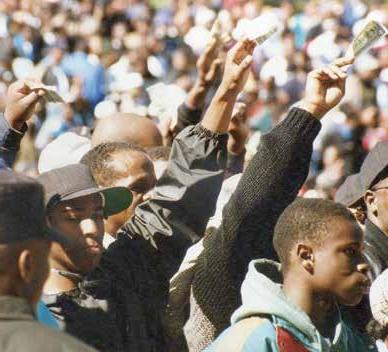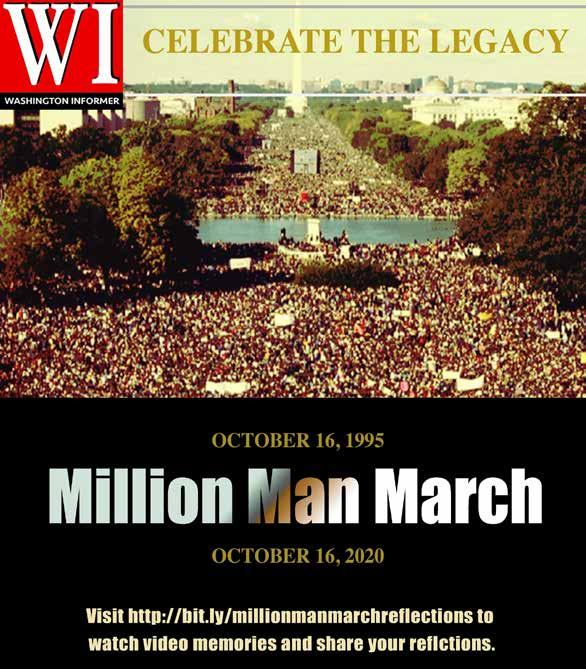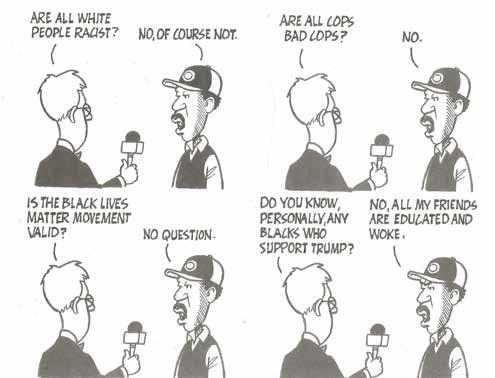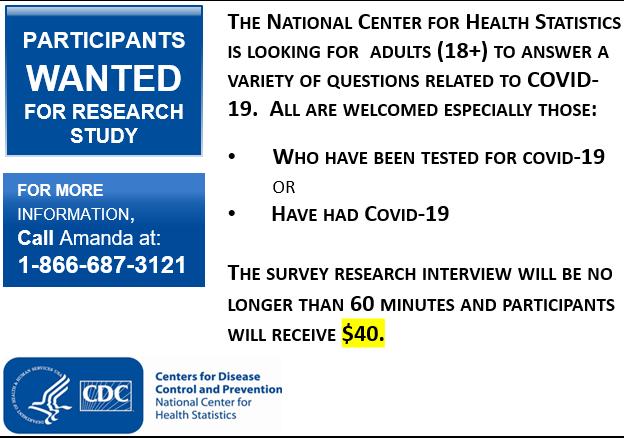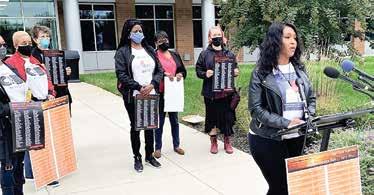LIFESTYLE MARCH from Page 1 “What I remember most was the tremendous support for the Million Man March from The Honorable Mayor Marion Barry and the City of
the District of Columbia that involved every city agency,” Chavis reminisced. Chavis remembered that the D.C. Local Organizing Committee met twice a week for five months leading up to the Oct. 16 March.
5 Black men raise their hands in solidarity during the Million Man March in October 1995. (Robert R. Roberts/The Washington Informer)
In reporting on the event, the Nation of Islam’s official website noted that “there was a sea of Black men, many who stood for 10 hours or more sharing, learning, listening, fasting, hugging, crying, laughing and praying. The day produced a spirit of brotherhood, love, and unity – like never experienced among Black men in America. “All creeds and classes were present: Christians, Muslims, Hebrews, Agnostics, nationalists, pan-Africanists, civil rights organizations, fraternal organizations, rich, poor, celebrities and people from nearly every organization, profession, and walk of life were present. It was a day of atonement, reconciliation and responsibility,” the statement read. While some estimates placed the attendance at about 500,000, others suggested as many as 1.7 million attended. Impressively, Chavis attested that the march received very little pushback, not even with Minister Farrakhan’s involvement. “Minister Farrakhan’s leadership of the Million Man March was not a problem or issue for D.C. officials,” he said. “However, the mainstream media publications, TV and radio in D.C., Maryland and Virginia were all mainly publishing and broadcasting negative and counterproductive news coverage about the Million Man March days before, on the day of and days after the march,” he pronounced. “It was, however, the Black Press of
America via the National Newspaper Publishers Association [NNPA], and especially The Washington Informer, The Washington Afro, The Afro in Baltimore, The Baltimore Times, The Journal and Guide in Norfolk and the Richmond Free Press who covered the Million Man March truthfully, accurately and authentically,” he stated. Throughout most of his life, Dr. Benjamin F. Chavis, Jr., has marched for justice, freedom and equality. The civil rights icon, who serves as president and CEO of the NNPA and host of the Public Broadcasting Service show, “The Chavis Chronicles,” began his life of service as a youth coordinator for the Rev. Dr. Martin Luther King, Jr. and the Southern Christian Leadership Conference. A North Carolina native and member of the famed Wilmington 10, Chavis formerly served as president of the NAACP and co-founded the HipHop Summit Action Network. In the immediate aftermath of the 1995 March, Black-on-Black crime reportedly decreased to an all-time low in the District and across the country. The immediate results of the march proved impressive. Following the event, 1.7 million Black men registered to vote and the NAACP, along with numerous Black churches and civic organizations, reported major increases in membership. Additionally, in the weeks following the March, the National Association of Black Social Workers reportedly re-
ceived more than 13,000 applications from families of color seeking to adopt African-American children. The now legendary event also inspired the Million Woman March, Million Father March and the Million Hoodie March, the latter in support of justice for Trayvon Martin. In 2011, a Million Man March in Tahrir Square took place in Egypt, demanding the resignation of Egyptian President Hosni Mubarak. While one scholar recently referred to the original Million Man March as an act of solidarity and commitment in the Black community that’s been difficult to replicate, Chavis lamented that crime among those in the Black community has surged once more. He said many have forgotten or are unaware of the message of the March. “The mission and message of the Million Man March are needed again today as it was an effective mission and message 25 years ago,” he said. “We do not need to repeat history necessarily. However, what is needed today is to learn from our history in America and throughout the world.” “When Black people come together in greater unity to end poverty, oppression and self-destruction, we will have the ability and the power to build stronger Black families, communities, businesses and lasting institutions that will all serve together to mitigate and to seriously decrease Black-on-Black crime and all other forms of Black self-destruction,” he said. WI
Black Brothers from the DMV Remember 1995: ‘We Were Part of History’ Local African-American Men Share Memories of Million Man March, Twenty-five Years Later By Hamil Harris WI Contributing Writer
CHUCK HICKS
“During the 1963 March on Washington, local Blacks were warned to stay away but we refused to do the same during the Million Man March. Black men came from everywhere because we understood that no matter where we lived, we were all facing the same challenges as Black men,” said Hicks, 75, whose father, Bob Hicks, was the founder for the local chapter of a group called The Deacons for Defense, who carried guns to protect their community and marchers from angry and often violent whites. “Mayor Marion Barry, after hearing me talk about my father’s work and upon the advice of Ben Chavis, put me on the executive board for the March.
28 - OCTOBER 15 - 21, 2020
I was then council president of the American Federation of State County and Municipal Employees for D.C.’s government employees comprised of 22 locals representing 22,000 employees excluding police, firemen and teachers.” “None of the major unions nationwide endorsed the March because Farrakhan and the Muslims were spearheading it. But because Chavis was in charge, our union chose to become the host union for union locals. Many locals who were predominantly Black came by the thousands from New York, Chicago, Detroit and California and it made a big difference.” “Black men identified that this was something for us. The important thing about the March was it brought one million black men together without the help of whites. It made us feel like
human beings, like men and good about ourselves. We got a lot of support from Black women who talked with pride about their men who attended. They stayed home so their men could have their day.” “When I spoke at the March and saw military men, gay men, brothers in suits and college men, a wonderful feeling that came me – over everyone. It’s 25 years later but like that sign which was carried by sanitation workers in Memphis during their strike in 1968 which read, “I Am a Man,” Black men are still exclaiming the same thing – reminding one another, the nation and the world that we matter.”
Officer Kevin Brittingham, 51, arrived at work around 3 a.m. on the morning of the Million Man March. “I just remember the atmosphere and a calming energy as hundreds of buses filled with Black men of all ages arrived and the love that was being spread. Now, 25 years later, I’m saddened about what has happened since that day. Minister Farrakhan got us to come together without incident. It was all about brotherly love. We need to recapture that spirit again.”
MPD OFFICER KEVIN BRITTINGHAM
Scott Bishop, 72, worked with the D.C. Local Organizing Committee during the Million Man March. The father of three boys and two girls said
Metropolitan Police Department
D.C. COMMUNITY ORGANIZER SCOTT BISHOP
he was still mobilizing people on the evening before the March. “Marion Barry had us rounding up people and loading up buses for the March but by the time the sun had come up, folks were already coming into the city on their own buses. But the only way they could get downtown was by walking. It looked like two million people out there. The March changed my life and afterwards I opened a non-profit. It showed me that I could work in the Black community and gave me a sense of pride after seeing Blacks from all walks of life came to the event.”
KYLE MCAFEE
“There were hundreds of vendors at the Million Man March,” said McAfee, 66, from Temple Hills who was
MARCH Page 30
THE WASHINGTON INFORMER / WWW.WASHINGTONINFORMER.COM


